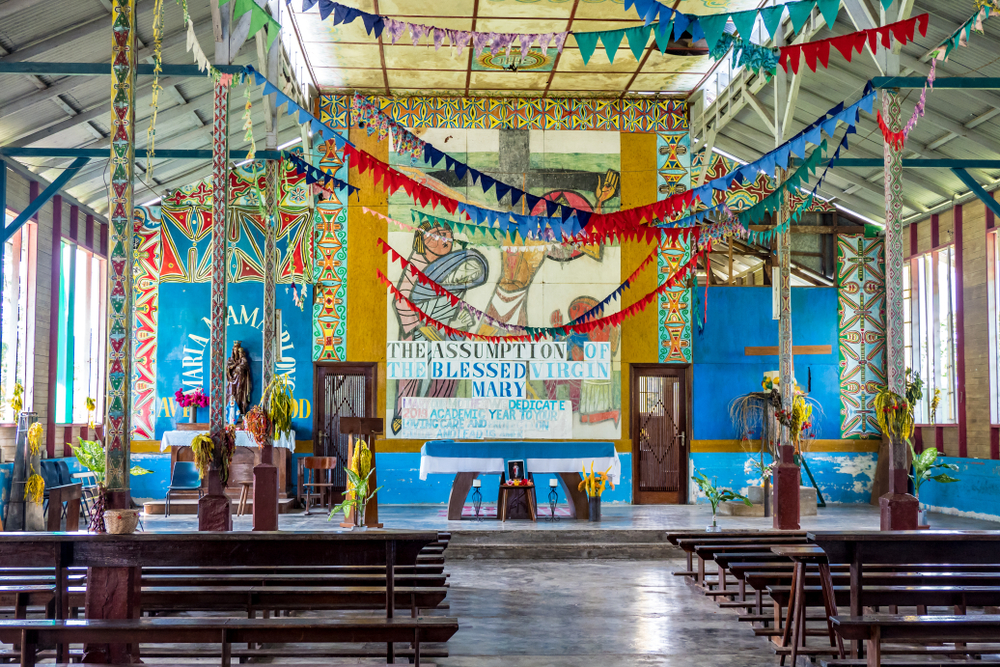It was the Cold War, and Portugal’s empire was collapsing. The dictatorial regime established by António de Oliveira Salazar was enduring a revolution, and thus the once great colonial enterprise that ruled some of the great ports of Africa, the Americas, and Asia was falling. By the end of the 1970s, only one small Asian port remained of the once mighty empire: Macau.
But unlike with other NATO members, the U.S., the U.K., and others did not come to the defense of Portugal, even in its fight against communist rebels in places such as Mozambique, Angola, Guinea-Bissau, and São Tomé and Príncipe. Worse yet for Catholics was the fact that NATO would not and Portugal could not fend off the Indonesian invaders in the former Portuguese colony now called East Timor. Why?
The reasons were simple. NATO needed Indonesia as an ally against the Soviet Union, and defending East Timor would be detrimental in the quest for control of Southeast Asia. Therefore, the world watched as East Timor received minimal support against the genocide inflicted upon it by the Indonesians, who claimed their struggle was anti-imperialist.
Anywhere from 17,000 to 19,000 East Timorese were killed in many executions, while between 80,000 and 180,000 suffered war-related deaths in what would be deemed crimes against humanity. Some estimates put this number as high as 300,000.
Despite this reality, when it came time for East Timor to become truly independent in 2002, it chose to align with the West! So how did the West suddenly become a friend?
This answer is the Catholic Church.
The Catholic Church played a vital role in helping secure East Timorese freedom by delivering shelter, food, clothing, sanctuary, and a common identity in its struggle to establish one of two majority-Catholic sovereign states in the region(the Philippines being the other).
The Catholic Church played such a significant role that, if you take out sovereign entities that are run by the church or affiliated with it like the Vatican city-state, no other sovereign state is more Catholic than East Timor: Prewar Catholic numbers were about 20%; now they hover at 96%. It was the work of East Timorese Catholic bishops that helped secure peace and independence, earning one such bishop, Carlos Filipe Ximenes Belo, a Nobel Peace Prize (sharing it with current president José Ramos-Horta).
So why is East Timor’s Catholic history important today? Simple: The People’s Republic of China (PRC), which serves as the Pacific region’s major oppressor, especially in Southeast Asia and the South China Sea, and most recently in Oceania, has been seeking to conquer new territory for its military, economic, and political sphere of influence.
The PRC has been trying to win the war of the Pacific against the U.S. and the Republic of China (Taiwan) by flipping many of the states’ official recognition of who or what exactly
“China” is from Taiwan to the PRC, as well as attempting to establish control of the waters in these regions via PRC-controlled ports and, potentially, even military bases. The PRC also hopes to disrupt the free waters the U.S. Navy provides via open shipping lanes so as to control more territory and attain more power and money with more places to place military and PRC-aligned companies.
This is where the East Timor history lesson comes into play.
Earlier this year, the PRC signed a deal with the Solomon Islands that was highly unpopular among the locals. It effectively allows the PRC to set up military bases and send in security when there are “disruptions of peace.”
The Solomon Islands sit almost 2,000 miles from the Australian east coast and share a sea border to the north with Western ally Papua New Guinea (PNG), a country the PRC has already tried to buy off once.
But, much like in Indonesia, there is a region within PNG that seeks independence and has fought a revolution already for these goals with very little Western support. And like East Timor, this region is majority Catholic, and its struggle is steeped in Catholic identity, especially in the form of Marian devotions. This Catholic region is the Autonomous Region of North Bougainville, which sits within the northern-most part of the Solomon Archipelago.
North Bougainville has a long history of passing through others’ hands: It was once a German colony that became British and then Australian following WWI. As was the case with East Timor, North Bougainville’s fight for independence from Papua New Guinea started in 1975 with its demand to control land rights via a declaration of independence, while PNG and other regional players like Australia wanted to exploit their land for one of the world’s largest copper mines that doubles as a gold mine.
Separatist fervor grew amid many abuses by the PNG forces, leading to an armed revolution from 1988 to 1998, costing more than 10,000 lives, and possibly up to 2,000 lives in direct conflict. The bloodshed became so horrific that PNG called in private mercenaries, which gained sympathy at the very least for North Bougainville and its struggle.
This turn of events led to negotiations that established a framework allowing North Bougainville to hold an independence referendum within 20 years, which it did in 2019. More than 98% of the people voted for independence, and it is likely that North Bougainville will become an independent country sometime between 2023 and 2027.
Yet, as with East Timor, the West has become ambivalent about the prospects of North Bougainville gaining independence, hoping not to anger Papua New Guinea, as losing them as an ally against PRC interests would be severely dangerous for the region. Enter, once again, the Catholic Church.
With the uptick in persecutions of the Catholic Church in the People’s Republic of China, it has become paramount for the church to fight for its own interests in the Pacific, and that means it must take the West’s side, even if covertly. The goal of the church should be to use its bully pulpit to influence the North Bougainvilleans to enter the Western camp like many of their neighbors in the region, especially the majority-Catholic ones. There are two good reasons for this.
First, the Catholic Church should seek the spiritual good of the country, and losing its freedom to worship as it pleases to an extremely repressive and anti-religious regime is certainly not a step in that direction. Therefore, to keep the Catholic Church free and vibrant in North Bougainville, it is imperative the church seek a way for North Bougainville to stay out of the PRC’s sphere of influence.
And second, North Bougainville is strategically important for the U.S. in its fight to keep the Pacific from falling into the total control of the PRC. Given that it sits north of the Solomon Islands, North Bougainville, in addition to Western-aligned Indonesia, PNG, and Nauru, provides an important strategic defense, cutting off the PRC’s potential military presence in the Solomon Islands. The U.S. needs the Catholic Church’s role in civil society to place North Bougainville under the West’s sphere of influence to ensure a wall of separation between the new PRC interference in the Solomon Islands and the PRC itself.
The United States, however, cannot do this on its own. If either a newly independent North Bougainville or Papua New Guinea itself falls into PRC control, and the Federated States of Micronesia falls under PRC control, too, then the PRC would become even more threatening to American sovereignty and to the sovereignty of its allies, with Guam and the Northern Mariana Islands providing the last line of defense east of Taiwan, which itself is a key ally of both the U.S. (unofficially) and the Catholic Church via the Holy See (officially).
And with the recent crackdowns on Catholic clergy and the church as a whole in the PRC, especially with the recent arrest of Cardinal Zen in Hong Kong, the Catholic Church really needs the American umbrella to continue protecting the Pacific from the Chinese Communist Party.
The Pacific Ocean is the world’s largest and most important ocean, featuring the two great world powers, the United States of America and the People’s Republic of China, as well as most of the world’s shipping and thus free trade. Controlling the Pacific may not be the job of the Catholic Church, but ensuring that Catholics can worship in the Pacific is. Making sure Pacific states retain their Catholic roots may be of no concern to the U.S. and other Western powers, but securing another ally in the region is of paramount importance. Therefore, the Catholic Church and the U.S. should work together to make sure that if North Bougainville does become independent, it falls into America’s and the West’s sphere of influence. And the Catholic Church is the only institution with the widespread clout in North Bougainville that can help secure this foreign policy objective.

